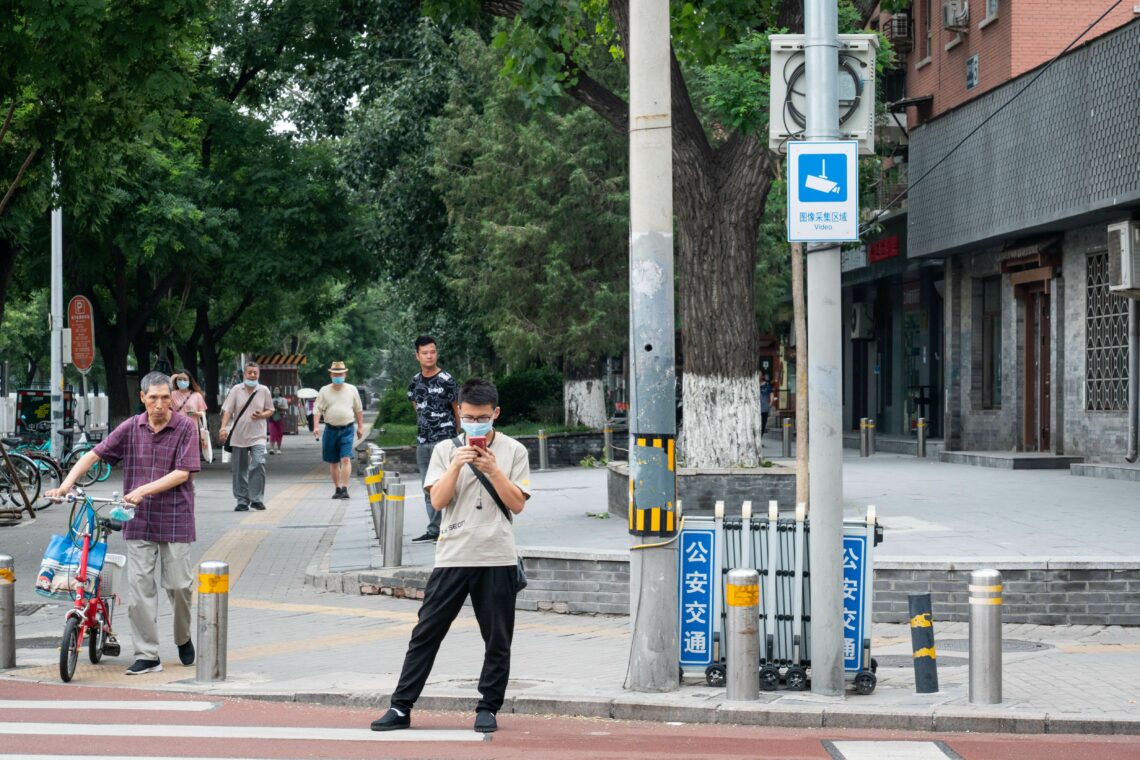China’s social credit system – a new Cultural Revolution
Beijing’s latest attempt at disciplining its citizens could prove even more thorough than the Cultural Revolution of the 1960s. The social credit system now controls a growing number of aspects of daily life in China, and it appears likely to continue expanding.

In a nutshell
- China’s social credit system is evolving rapidly
- It will grow more sophisticated as technology advances
- Beijing will need time to create a nationwide network
The Cultural Revolution of the 1960s was a comprehensive effort by Mao Zedong to regulate how people think and behave. Citizens were forced to read the “Red Bible” and honor the Communist Party with quasi-religious rituals. Mutual supervision was encouraged throughout all of society. People were told that the way of thinking and behavior advocated by Mao Zedong was the only correct one.
Sixty years later, China is undergoing another Cultural Revolution, the goal of which is essentially the same as Mao’s, namely, to establish new norms of thought and behavior. However, the approach and the means of implementation are far more comprehensive and sophisticated than in Mao’s time. On the surface, the harsh monitoring of the 1960s is a thing of the past in present-day China. But in reality, Chinese society is now supervised by surveillance networks and all sorts of digitized punishments and rewards, creating a different kind of pressure.
Development of the SCS
In most modern countries, citizens and businesses only have to think about their credit score when it comes to a public record of their behavior. China’s modernized governance model, however, includes a “social credit system” (SCS) that regulates almost everything.
The idea was born in August 1990. At that time, the People’s Bank of China and the State Council issued a document where “social credit” was mentioned for the first time. The term referred to the fact that several Chinese enterprises were then evading bank debts, defaulted on liabilities between enterprises, committing various irregularities in the securities market, and flooding the market with shoddy counterfeit products.
The SCS is closely related to China’s emerging mass monitoring system.
Against this backdrop, the need arose to follow the example of Western countries and establish an institution monitoring “social credit.” The government under Xi Jinping, however, extended this concept to all aspects of social life. The SCS has become a tool to maintain power and shape citizens’ behavior under an authoritarian regime, rather than a means of recording financial performance.
It should be noted that the SCS is closely related to China’s emerging mass monitoring system, as well as the rapid development of face recognition technology and big data analytics over the last decade. China’s Skynet surveillance system, for example, is estimated to have about 200 million public surveillance cameras around the country. By the end of last year, the number of public surveillance cameras was expected to reach 626 million.
With the emergence of SCS, several other similar systems have also surfaced. In 2019, the Chinese Communist Youth League launched a credit rating mobile app called “Younitong” to monitor and indoctrinate the youth. Another example is the “Strong Country of Learning” app launched by the Central Propaganda Department, which party members are required to download and use every day. Civil servants, employees of state-owned enterprises and public schoolteachers are also required to use it. The content is mainly Xi Jinping’s writings and speeches. Users can earn points for using the app in the morning, at lunchtime and at night (an incentive to study during leisure time rather than at work).
Three major components
The SCS consists of three interrelated components: a master database, a blacklisting system and a reward and punishment mechanism. Currently, provincial and municipal governments, state agencies and the central bank have pooled their data into a single database called the National Credit Information Sharing Platform (NCISP). At the same time, Chinese government agencies at all levels have developed their own blacklists and red lists (“red” refers to good behavior, “black” is the opposite), and local governments are authorized to blacklist individuals within their jurisdictions. These files are available on the NCISP’s website. So far, China has not launched a nationwide scoring system for all individuals. However, localities are allowed to design and implement their own.
Purpose of implementation
The CCP under Xi Jinping wants citizens to be obedient and self-disciplined. They should also immediately respond to the Party’s call if need be. For this purpose, the SCS is an ideal tool.
People with high scores get benefits and priority access to certain services.
People with high credit scores get extra benefits and priority access to certain services. People with low credit scores may lose access to a range of services, including traveling abroad and some types of education. As of June 2019, official data from the National Development and Reform Commission (NDRC) shows that 26.82 million people were banned from purchasing airline tickets. Another 5.96 million people were prevented from purchasing high-speed train tickets due to a breach of “trust.”
Structure of the SCS
China’s current social credit system has three levels: one overseen by the NDRC, one created by the central bank, and the one used by private credit rating institutions for big data analysis, like Alipay’s Sesame Credit. The NDRC does not use the same system as the central bank because of differences in their interpretations of standards. But both are run by the government.
Ant Financial Services is one of the eight private credit institutions that were approved to monitor personal credit rating. It is more widely known as the operator of Sesame Credit, built on a voluntary basis for users. It analyzes and scores consumers on factors such as their spending behavior and preferences. There are many ways to earn points, like regularly buying household items such as diapers. Points can also be subtracted for certain behaviors, for example buying many video games.

Different criteria for scoring
More than 170 cities in China had built credit information sharing platforms by the end of June 2018. Currently, the National Credit Information Database developed by the People’s Bank of China has become the largest personal credit assessment system in the country.
The criteria in scoring citizens and enterprises vary from place to place. Take Rongcheng in the Shandong Province, for example. The city’s 790,000 local and foreign residents, 16,000 businesses and 1,420 social organizations have been included in a credit system. These are reportedly assigned an initial score of 1,000 points. Certain behaviors like volunteering and donating blood earn extra points. Defaulting on bank loans and traffic violations, for example, cause points to be deducted. The system classifies people into six grades: AAA, AA, A, B, C, and D. The final grade affects personal loans, job promotions and many other spheres of life. People with high credit ratings will be prioritized when they apply for a job in the public sector.
Human rights violations
A number of penalties in the SCS clearly violate basic human rights and privacy. There are several punishments for which there is no official documentation. This leaves the penalized citizen with no recourse to protest or complain. In addition, there are practices that are intentionally humiliating and that violate privacy. For example, in July 2017, a court in Laizhou, Shandong Province, required three communications companies to change the call tones of targeted citizens with a message warning others that the person is “discredited.”
In Kaifeng, Henan Province, the local court also tried to publish the photos of debt defaulters on the popular TikTok app. In Suining City, SCS points are being deducted for hindering the functioning of “party and government offices, enterprises and construction sites by stalking or making bothersome visits” or “using the internet and SMS to falsely accuse others,” with highly arbitrary definitions of both offenses.
Impact on foreign enterprises
Under the SCS, Beijing announced a national enterprise ranking in September 2019 that reportedly includes 33 million businesses. The number is increasing over time, and foreign companies are included.
Companies’ behavior is constantly monitored, and their score adjusted in accordance with what the CCP likes to see. In cases of noncompliance, a business may face serious consequences like sanctions or being blacklisted. A poor rating can jeopardize corporate financing. For example, public bidding and business with government agencies can be strongly restricted for low-ranking companies.
Chinese authorities are confident in their ability to control domestic and foreign companies through soft means.
Political performance has become a matter of the highest importance for foreign companies. In April 2018, the Civil Aviation Administration of China (CAAC) demanded that Taiwan not be used as a destination name, stating that the government would “record your company’s serious dishonesty and take disciplinary action” against any noncompliant business. The airlines complied in unison. They felt threatened because of a pilot credit system project for the civil aviation industry.
As the relations between the U.S. and China have become tense, especially with regard to sensitive technologies, Beijing is trying to remove various obstacles, such as restrictions on joint ventures, to attract foreign companies. But this also means Chinese authorities are confident in their ability to control domestic and foreign companies through soft means like the SCS.
Scenarios
China’s SCS is part of Xi Jinping’s effort to create a society that fully abides by a set of “socialist norms.” The latter, in his eyes, are superior to the values of the West, but they also differ from traditional Chinese Confucianism. With the rapid development of AI and big data analysis, the system will become more sophisticated and will come to encompass more aspects of citizens’ lives.
Yet, it will still take years for a nationwide system of punishment and reward to emerge, although part of it already exists. As long as censorship and this mostly invisible repression continue, these measures are unlikely to backfire for the Chinese leadership. Instead, China will tout it as a successful governance model to other “like-minded” countries, like Laos, Cambodia and Pakistan. Individuals are already being disciplined through the SCS. With time, foreign companies in China will also learn what is politically correct and where the red lines are. This will prove yet another challenge for foreign governments trying to access Chinese markets, since Western norms and regulations requiring companies to respect human rights will increasingly clash with some of China’s policies.







